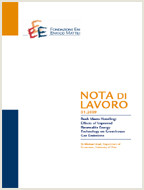Canada – Renewable Energy: Implications for WTO Law on Green and Not-so-Green Subsidies

12.11.2014
Steve Charnovitz, Carolyn Fischer
K33, Q48, Q56, Q58
Feed-in-Tariff, Renewable Energy, Subsidies, International Trade, WTO, Green Growth, Local Content Requirement
Climate Change and Sustainable Development
Carlo Carraro
In the first dispute on renewable energy to come to WTO dispute settlement, the domestic content requirement of Ontario’s feed-in tariff was challenged as a discriminatory investment-related measure and as a prohibited import substitution subsidy. The panel and Appellate Body agreed that Canada was violating the GATT and the TRIMS Agreement. But the SCM Article 3 claim by Japan and the European Union remains unadjudicated, because neither tribunal made a finding that the price guaranteed for electricity from renewable sources constitutes a ‘benefit’ pursuant to the SCM Agreement. Although the Appellate Body provides useful guidance to future panels on how the existence of a benefit could be calculated, the most noteworthy aspect of the new jurisprudence is the Appellate Body’s reasoning that delineating the proper market for ‘benefit’ analysis entails respect for the policy choices made by a government. Thus, in this dispute, the proper market is electricity produced only from wind and solar energy.
***
Suggested citation: Charnovitz, S., C. Fischer, (2014), ‘Canada – Renewable Energy: Implications for WTO Law on Green and Not-so-Green Subsidies’, Nota di Lavoro 94.2014, Milan, Italy: Fondazione Eni Enrico Mattei.
